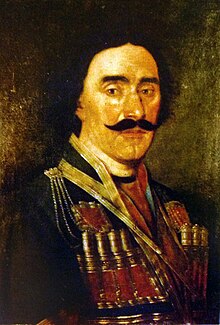Solomon I of Imereti
| Solomon I | |
|---|---|
 |
|
| King of Imereti | |
| Reign | 1752–1782 |
| Predecessor |
Alexander V of Imereti Teimuraz of Imereti |
| Successor |
Teimuraz of Imereti David II of Imereti |
| Born | 1735 |
| Died | 1784 |
| Dynasty | Bagrationi dynasty |
| Father | Alexander V of Imereti |
| Mother | Tamar Abashidze |
| Religion | Georgian Orthodox Church |
| Signature |  |
Solomon I (Georgian: სოლომონ I) (1735 – April 23, 1784), of the Bagrationi Dynasty, was King of Imereti (western Georgia) from 1752 to 1766 and again from 1768 until his death in 1784.
Solomon was a son of Alexander V of Imereti by his second wife Tamar née Abashidze and succeeded upon his father's death in 1752. He immediately launched a series of stringent measures against the renegade nobles and slave trade from which they profited in conjunction with the Ottoman authorities. In 1752, the aristocratic opposition staged a coup, but Solomon quickly regained the crown and began a program of reforms aimed at stabilizing the kingdom torn apart by chronic civil wars. The Ottomans, which saw Imereti as the sphere of their influence, sent in an army, but Solomon succeeded in mobilizing his nobles around him and defeated the invaders at the Battle of Khresili in 1757. The same year, he forged an alliance with his kinsman, Heraclius II, who ruled in eastern Georgia. The Ottoman raid continued into the 1760s until they drove Solomon from his capital at Kutaisi in 1765 and placed his cousin, Teimuraz on the throne. In 1768, Solomon managed to stage a comeback, but his kingdom remained occupied by the Turks. The same year, another Russo-Turkish broke out, and in May 1769, Solomon traveled to Tbilisi to meet with Heraclius II. The two kings decided to request five Russian regiments and join the war with the Ottoman Empire in exchange of the guarantee that Georgian interests would be protected in the final Russo-Turkish peace deal. The Russians sent a small force under General Gottlieb Heinrich Totleben who helped Solomon to recover Kutaisi in August 1770, but the general's rudeness and condescension alienated the Georgians; Totleben was quickly recalled from Georgia, but his successor failed to take the Ottoman-held Georgian port of Poti on the Black Sea. After the war was over, Solomon was able to force his autonomist vassals, princes of Mingrelia and Guria, into submission, and continued antagonizing the Ottoman hegemony in the region. Having crushed the Ottoman-sponsored invasion from Abkhazia in 1779, he made a series of forays into the Turkish-controlled southwestern Georgian lands. He died in March 1784 and was buried at the Gelati Monastery. He was canonized by the Georgian Orthodox Church on 22 December 2016, his feast day set for 23 April (NS 10 April).
...
Wikipedia
